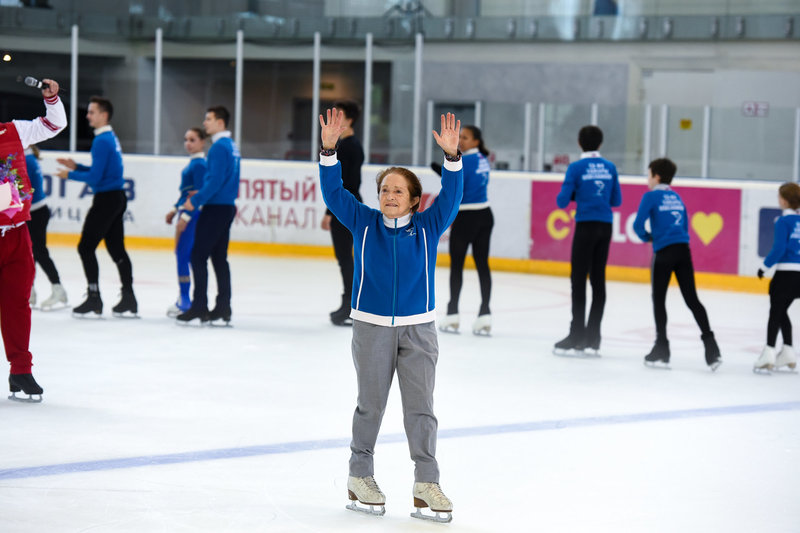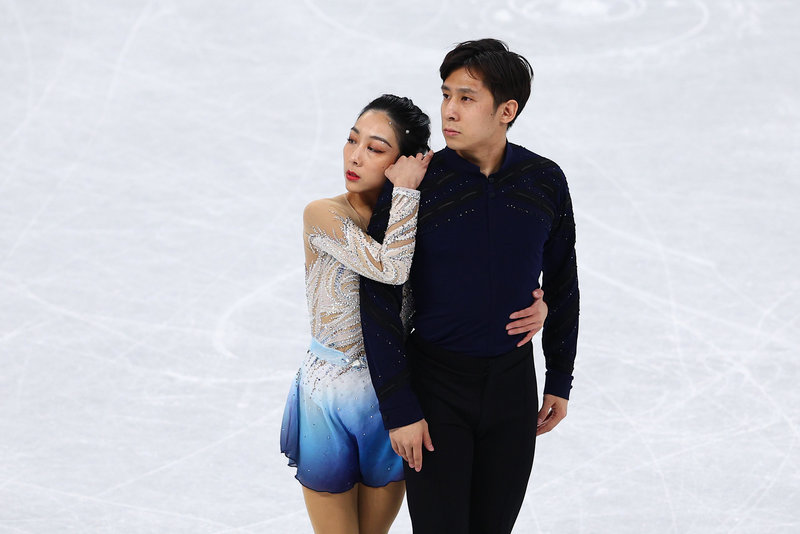Fedor Klimov — champion and silver medalist of Sochi-2014 paired with Ksenia Stolbova . After the end of his career, he worked for several years in the technical committee of the International Skating Union (ISU), then became a coach.
During the second leg of the Junior Russian Grand Prix, Klimov brought a pair of Veronika Merenkova/Danil Galimov to the ice. How Fedor got used to the coaching role, who helps him in this activity and why pair skating is stagnating – he told all this in an interview with correspondents.
“WE MUST SELECT THE KEYS TO ATHLETES”
— Fedor Alexandrovich. Have you gotten used to this behavior?
– Yes, the athletes have already gotten used to it.
– How does it feel to be a coach at Iceberg – the place where you won two Olympic medals?
– As for Sochi and Iceberg, I will say that there are no special emotions anymore. We constantly train here. There’s nothing like me going back to memorable places. It’s already gone. I feel good as a coach. This activity makes me happy.
Are you satisfied with the progress of your coaching career? Surely you have to look at figure skating from a different angle, because the job of a coach is not only technical aspects, but also psychology, communication.
– You said everything correctly. We need to get the keys from the athletes. It’s the complexities that add interest. I can say that’s one of the reasons I love coaching. Individual work with athletes is very interesting.
– Coaches, who until recently were athletes, often say that when they see the progress of the students, they are happier for them than for themselves. Does this sound like the truth?
– It’s hard to compare. For me, these are completely different things. I feel a very great pleasure, first of all, when I see the result of my work. When guys get what we train.
– Is the emotion stronger when you take a couple to the start or when you go out on the ice yourself?
– I can also say that for me they are different things. Inside myself, I personally experienced more before departure than now. But at the same time, there is also a big excitement for my guys going on the ice. These are different emotions, but also very strong.
“OUR GENERATION HAD LESS DISCIPLINE”
– You are now working with a new generation of athletes. How is it different, for example, from yours?
– There is definitely a difference. We had less discipline. In our time, there were more hooligans who could do something during competitions and training camps.
– Set the bedroom on fire?
– In our time, there have been various excesses, I will not hide from it. The new generation is more professional, they are not distracted by such things. At the same time, I notice that we could, again, somewhere in breach of discipline, play football and other games. And now you can’t drag guys around, even if you allow them to move. Sometimes you have to force something.
– So they’re just going to rest after practice?
– Yes, I am surprised that the guys do not quickly switch to some kind of activity, but immediately rest. A bit lazy in this regard.
– Nina Moser pushed you to become a coach. Now you seek advice from the older generation, exchange opinions?
– Nina Mikhailovna helped me a lot at that time. For quite a long time I worked alongside her, I learned a lot from her, even when I was skating, and later when I myself stood alongside her as a coach. I try to get the most out of those I know. I think the generation of adult specialists can bring a lot, and the new vision of young coaches also interests me a lot. I try to collect all the information and apply all the most useful in my work.
– The legendary Tamara Moskvina continues to create couples that are in the top of the world. His advice must be valuable?
There is no doubt about his professionalism. I was pleasantly surprised when she came up to me and asked me about my vision. I understand that she collects opinions, also tries to learn some tricks from new generation coaches, mixes them with her experience. This helps him to prepare high-level couples. I have great respect for Tamara Nikolaevna and I agree with her position on this season that it is partly experimental, so you can afford to try new things – programs, elements, after spending this period of conditional isolation with benefit.
– It is believed that the coaches of the old formation are all hard, strict, they will not put a word in their pocket. What category do you belong to?
– I think I’m too soft. I’m a good coach, but you have to be stricter. I try to become like that, I have to push myself to that.
Are rigor and accuracy different things? Or does one flow from the other?
– One is close to the other.
“COACH COACHES HAVE LITTLE INFORMATION ABOUT ULTRA-C ELEMENTS”
– You recently worked on the technical committee of the ISU. What gave you?
– It’s a pity that it was not long – only three years. Most of them were pandemic – we were mostly working online, remotely. I couldn’t interact with people in real life. But this job gave me invaluable experience. I was able to communicate with people who were creating and changing the rules, looking for new trends. They changed the rules, the ISU accepted them, we all have to obey that.
It was very interesting to watch the process – how it all happens. And, of course, to understand from the judging side how the elements and programs are evaluated. For a coach, this is very useful, because with this knowledge in mind, you begin to prepare your athletes, define elements, etc. You understand how the judges will evaluate it, what criteria they will apply.
– We see that there has been a serious breakthrough in men’s skating. Ilya Malinin did a quadruple axel. Among women, ultra-si has long been the norm. For couples, we seem to be witnessing a technical stagnation. How to promote the technical development of pair skating?
– I spoke about it when I was still on the technical committee: about a year and a half ago. I think we need a development push, so that we also have elements of ultra-si. However, we entered a vicious cycle, as we reduced the cost of these items. Essentially, this was done to make skaters take less risk. At some point, due to the many injuries while performing the elements, it was decided that it was dangerous and there was no need to push the athletes to perform them.
– It’s artificial confinement, it turns out.
“Essentially, yes. I’ve been advocating for the time for change to come to our sport – we don’t need at least not much but to increase the cost of items so athletes see the value in studying something more complex. But it’s still a risk, it turns out. And you have to at least get to the point where skaters can perform ultra-c without taking so many risks.
They said to me, “When they do that, we will increase the cost.” In other words, such a precedent must first occur. They will be able to increase the price of ultra-c in pair skating when a duo appears that performs complex elements, but it doesn’t look scary and traumatic at the same time. It turns out a dead end. Nobody teaches because it’s cheap. It makes no sense if you get fewer points with an error than with a triple.
However, I heard from the press that in the group of Tamara Nikolaevna they work on quadruple elements. They’re going in that direction, which is very cool, in my opinion. I hope this will give impetus to further development.
– At the last Olympics, the Chinese duo Sui Wenjing and Han Cong did a quadruple twist to get ahead of Anastasia Mishina and Alexander Gallyamov.
– We went through all this too, worked with our couples on this element, albeit on the ground. It’s not that easy, it’s a very long way. It takes a long time to set it up so that nothing is interrupted due to injuries. We have to develop a method.
– That is, it all depends on small nuances – where and how to put a hand, a foot?
– I mean, the triplets have been doing everything for many years. Everyone has studied it. Each trainer has different approaches on how to teach these elements. The quadruple twist has not yet been sufficiently studied. Very few people have done ultra-si, and even the trainers don’t have enough information to analyze these elements. I rely on my observations and my feelings.
Source : MatchTV
I am William Jackson and I have a passion for sports journalism. With over 3 years of experience in the industry, I have worked in a variety of roles to improve the quality and accuracy of sports news coverage. As an author at Athletistic, I specialize in covering football news and providing comprehensive analysis for fans around the world.






